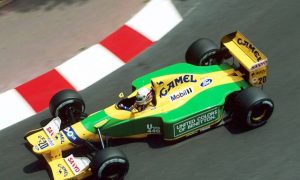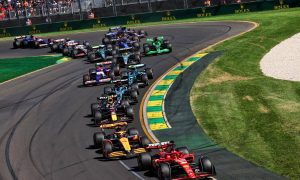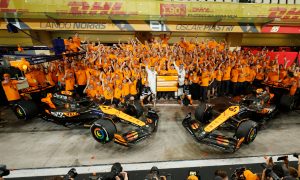They say you shouldn’t talk with your mouth full, but Eric Silbermann risks the wrath of Mrs Manners by having breakfast with a pot-pourri of paddock people.
During Saturday morning’s free practice session at the Circuit of the Americas, I indulged in a bit of internet surfing, checking out where to go shopping on Monday in Austin while keeping one eye on the giant screens in the Media Centre and getting on with writing features. I was not alone in ignoring much of the on track aquaplaning. But spare a thought for the TV journalists who have to commentate on very little for an entire hour and spare an even bigger thought for the radio commentators who don’t even have the occasional arresting image to count on. How on earth do you find stuff to talk about? I asked James Allen, currently the commentator for BBC Radio 5 Live. James has also worked for ESPN and ITV and covered the range of roles from pit lane reporter to lead commentator.
Remind me, how long have we known one another?
26 years.
Gosh, you came up with that with no hesitation. You’re a commentator, you know facts.
I started when I was four.
Yeah, I was fourteen, I think. It’s been a long time, hasn’t it? You were a press officer for Brabham.
With Martin Brundle and Mark Blundell.
Then a glorious career in broadcasting.
Well, I don’t know about glorious but long.
Let’s talk specifically about what’s happening here in Austin with the storm. It must be a commentator’s nightmare...
We’ve had this a few times. If you stick around as long as you and I have in this sport, you’ve been through most scenarios. This reminds me a lot of…
2004, Japan.
2004, Japan indeed. I was working for ITV at the time and in Suzuka, the TV compound is a makeshift building of tents, basically with metal poles in it so there’s millions of pounds’ worth of TV equipment in there and this typhoon was heading our way. So they dismantled the whole TV compound, put it back in the containers it had come in, and shipped it into some warehouse somewhere where it was going to be safe, on Friday night, and we were all told not to come in to the circuit on Saturday.
So myself and a couple of the Fleet Street boys and a few other journalists decided we would go and book a table in a restaurant overlooking the water so we could actually see this typhoon coming in and we’d be safe inside having a nice meal and a glass of wine while this typhoon hit.
We watched it coming towards us and then it just went to the left, missed us completely and went and sort of pulverised Yokohama or something and didn’t touch the circuit at all. Then of course it was one hell of a job to rebuild the TV compound, because qualifying was going to be on Sunday morning before the race. They completely rebuilt the TV compound overnight from Friday into Saturday and everything went ahead and it was a brilliant race. It’s hard enough doing this job at the best of times but when you’ve got no cars on the circuit. The other bad one was Canada a few years ago.
The longest race, the one that Button won.
Exactly. So you just have to keep going. Actually, I really enjoy those days. I was talking to Ted [Kravitz] (Sky F1 pit lane reporter) about it yesterday. He thought he’d had one of his best shows yesterday, in Free Practice 2, without any cars going round the circuit, because everybody’s in a mood to help out. At Silverstone it happened as well - we had free practice, do you remember? All the mechanics came to the front of the garages and were doing forwards and backwards gestures to the crowd in the grandstands and stuff. A great sort of spirit, like a Dunkirk sort of spirit, kicks in, doesn’t it?
Do you plan for it? On Friday, we knew that this was going to be the scenario so have you planned lots of things to talk about in advance to get you through FP3 for example?
You know yourself because you’ve done a fair bit of commentating with me and with other people over the years that you go into every session with a whole bunch of notes and things about the place, for example the fact the Colorado river passes through Austin, or the fact that this is the tenth different venue that’s hosted a US GP.
It has to be interesting but you make it like a discussion and if you’re a fan of Formula 1, then it’s an interesting discussion. There was me with Allan McNish and Andrew Benson, who’s the chief F1 writer for the BBC. There was Tom Clarkson and Lee McKenzie in the pits grabbing Christian Horner, Sebastian Vettel and others. So we had lots of great content and lots of great talking points.
It’s like a magazine programme.
Exactly. And on radio, as you know, you can be very imaginative in how you go about those sorts of things. You’re not restricted by any pictures, so I really enjoyed it. But I wouldn’t have enjoyed it if it had gone on for another two hours! I remember when McNish destroyed the barrier at 130R (Suzuka) in a Toyota, Martin Brundle and I had to keep talking on ITV with nothing to talk about for about two hours. That was pretty difficult.
But the ultimate for me, the worst ever, was in my very early days and someone had talked me into doing the Daytona 500 on Sky in the studio. What I know about NASCAR you could write on the back of a postage stamp, but I’d mugged up for a day or two beforehand, and it rained, so the presenter keeps asking me questions about Billy Bob Johnson or whatever and I was right on the limit of what I knew about NASCAR and it went on for hours and hours because they don’t run in the rain. That was the ultimate nightmare.
I remember getting about a 10-minute warning that I was going to do the commentary for the crowd in Monaco on the Porsche Cup and of course, it’s a lot of complicated German names, all the cars are exactly the same and towards the end of the race, it was getting to things like, “And here comes another Porsche 911 with a German driver, closely followed by another,” and when I got back in the Media Centre, our good mate George Goad (retired American writer) said to me, “Eric, that was like listening to Noel Coward commentating on a cricket match.”










